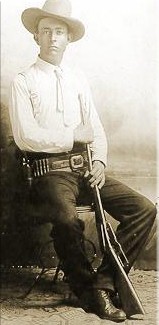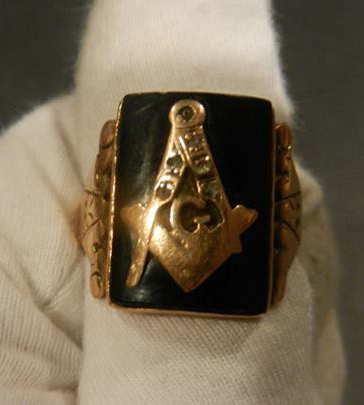Bro. Francis Augustus Hamer
"Frank"
1884 - 1955

Francis A. Hamer, Texas Ranger, son of Frank and Lou Emma (Francis) Hamer, was born in Fairview, Texas, on March 17,
1884. Known commonly as Frank or Pancho, he grew up on the Welch Ranch in San Saba County. In 1894 the family moved to
Oxford in Llano County, where Hamer worked at his father's blacksmith shop, but the lure of the cowboy life soon took
hold of him. In 1901 he and his brother hired out as wranglers on the Pecos County ranch of Barry Ketchum, brother of
outlaw Tom "Black Jack" Ketchum. In 1905 Hamer was a cowboy on the Carr Ranch, between Sheffield and Fort Stockton,
where, after capturing a horse thief, he was recommended by Sheriff D. S. Barker for a position with the Texas Rangers.
His first gunfight took place before he was a lawman, back when Hamer and his brother Harrison were sharecropping some
land for a man named Dan McSwain. McSwain approached Frank one day and offered him a special job for a great deal of
money. Frank jokingly asked, "Who do I have to kill for that?" but quickly sobered when McSwain told him.
When Frank declined the offer to become a hired killer, McSwain warned him not to tell anyone about his offer or Frank
and his brother would be dead men. Unsettled by McSwain's warning, Frank took to carrying a pistol while farming.
Frank's instincts were golden. While Hamer was plowing one day, McSwain appeared with a shotgun and shot him in the
back and the head. Hamer went down and as McSwain approached, Frank pulled his pistol and shot McSwain. Harrison Hamer
assisted in his wounded brother's escape, while the wounded McSwain went after his buffalo gun. Frank convalesced
for some time and when he was healthy he saddled his horse and sought out McSwain, who when found said, "I thought
I killed you." Frank replied that he had not and announced, "I'm here to settle our account." With
that said both men drew their pistols and fired. The account was settled.
Bro. Francis Augustus Hamer
"Frank"
1884 - 1955
Frank Hamer enlisted in the Ranger service on April 21, 1906, joining Company C, commanded by the cool and professional
Capt. John H. Rogers. As a private in Co. C, Hamer worked the country along the Rio Grande from horseback. In those
days, a Ranger company traveled around its assigned area, usually hundreds of square miles, just as they had done in
the 1800s. They investigated reports of cattle rustling, smuggling from south of the border, and were continually on
the lookout for wanted outlaws. It was still very much a frontier undertaking.
Back in those days, being a Texas Ranger was not the glorious job to which it has come to be regarded. Rangers generally
camped out, could be sent anywhere in the state, were discouraged from being married and having a family, and they did
it all for $30 to $50 per month, assuming the state treasury wasn't broke. Enlistments were generally for two year
periods, and Rangers often decided not to re-enlist due to better job offers in other branches of law enforcement.

Frank Hamer
Although Hamer carried a Texas Ranger commission from 1906 until 1933, there are a number of periods during which he had
resigned for better pay. During those times, he served as the city marshal of Navasota, Texas, as a special officer for
the city of Houston, Texas, and as a federal Prohibition officer. Another factor in this job skipping was that Rangers
served under the direct control of the state governor. And, especially during the early 1900s, governors used Ranger
commissions as political plums. In certain administrations, corruption was rampant. In fact, Hamer and the entire Ranger
force resigned in 1933 when Miriam "Ma" Ferguson took office.
In spite of these breaks in service, Hamer was a Ranger captain by the early 1920s. He had been involved in more than
50 gun battles and had been wounded a number of times. Throughout his lifetime, he was a private man. He would not
discuss his gunfights and adamantly refused to say how many men he had killed. Legend takes over when a man like Hamer

Frank Hamer
won't talk, and the claim was often made that he had killed more than 40 men and one woman.
In 1933, Frank Hamer retired as a Captain from the Texas Rangers, but because of his reputation he was sought after as
a peace officer where there was no peace, a bodyguard where someone was in dire danger, and probably most notably as a
man hunter, when the safety of the community dictated that someone needed to be captured.
The most famous of these hunts occurred in 1934, when Frank Hamer was commissioned as a special investigator for the
prison system to end the crime spree of the Barrow Gang. Frank studied their activity and movements and eventually
Frank was able to contact the family of one Gang member, Henry Methvin. The family agreed to cooperate in the capture
of Bonnie Parker and Clyde Barrow.
At 9:15 AM May 23, 1934 Frank's plan was put into action as Bonnie and Clyde stopped their car for a ruse set up on a
rural road near Gibsland Louisiana. Hamer along with other deputies called for the pair's surrender, but with a car
load of weapons at the ready Bonnie and Clyde made a move toward those weapons. Hamer armed with a Remington Model 8
semi-automatic rifle with a special 15-round magazine and his entire posse opened fire putting more than 100 rounds
into the suspects and their vehicle.
Frank Hamer retired in 1949 and in 1955 the lawman who had survived being wounded 17 times died of natural causes. He was laid to rest in Memorial Park Cemetery in Austin, Texas next to his personal hero, his son Billy, who was a Marine killed in combat on Iwo Jima.

Hamer Ring
Brother Frank Hamer was a Master Mason, recieving his degree in 1909 at Navasota Lodge #299, Texas

Hamer Ring